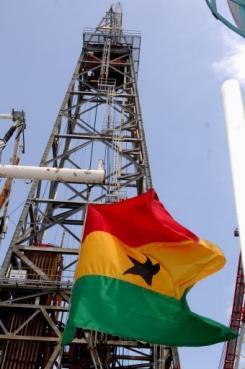
Photo: http://neftegaz.ru
There is much to reflect and build upon as Ghana approaches its one year anniversary as an oil producing nation. Development of the industry has been a whirlwind as production started only three and a half years after the discovery of offshore oil in 2007. New oil-rich fields have been discovered in addition to the Jubilee Field that started it all, and production currently stands at about 80,000 barrels per day.
Although there are obvious concerns about the management of oil revenues, job creation for Ghanaians, environmental issues, and the important laws that have yet to be passed or amended (such as the Local Content Bill and Petroleum Income Tax amendment), Ghana has taken steps in the right direction.
Perhaps the most encouraging development of the industry is civil society’s growing participation to ensure that oil wealth benefits the nation. Ghana has a history of vibrant civil society and it is no wonder that over the past few years various NGOs and the private sector have pulled together to make sure the Ghanaian public plays an active role in monitoring their government’s actions.
The passing of the Petroleum Revenue Management Bill was a huge feat for civil society because all of the transparency provisions it advocated for were eventually incorporated into the law. This includes the establishment of the Public Interest and Accountability Committee (PIAC), an independent watchdog for the oil industry.
A recent seminar in Kumasi organized by the Center for Social Impact Studies was the first in a series of education programs designed to encourage Ghanaian graduates to participate in their country’s budding oil industry. The CeSIS is urging government to facilitate more cooperation between oil sector stakeholders and academic institutions so that Ghana’s college graduates can obtain petroleum sector jobs and become drivers of their country’s development.
In the 2011 Ibrahim Index of Africa Governance, Ghana ranks 4th of 53 countries in terms of participation and human rights. For the participation sub-category, Ghana scored thirty points higher than the African average. Although the Ibrahim Index highlights general civil society activity, the work being done in the oil and gas sector undoubtedly contributes to this high ranking.
The Ibrahim Index scores are promising figures to note as Ghana’s oil production grows and more money is pumped into the economy, for active civil society is a sign of democratic progress and creates more government accountability. As petroleum revenue increases so does the need for transparency. The World Bank estimates that Ghana could receive an average of $1 billion annually through 2029, and this leaves a lot of room for either crucial development or devastating backsliding.
One of the major challenges facing civil society and the private sector is technical knowledge of the petroleum industry and how it operates. Industry-related laws, contracts with foreign oil companies, and the logistics of production are complex issues – but understanding the complexities is a must if civil society is to hold the government accountable. For example, once oil contracts are disclosed, monitoring depends first and foremost on the ability to understand contract terms and language. If you have ever read an oil contract you know that it is hard for even a college graduate to comprehend the legal framework and jargon.
In April Ghana’s Civil Society Platform on Oil and Gas released the “Readiness Report Card,” a report assessing the capability of government to manage the oil sector. Civil society was given a “C” in terms of its performance. Participation was applauded, but the need for capacity-building was stressed. The report pointed out that while many public forums have been held, including radio and TV discussions and debates, they were largely uninformed.
CIPE is partnering with Ghana’s Institute of Economic Affairs (IEA) to help build the technical skills needed to effectively monitor government’s management of the oil industry. Much of the work is focused on developing assessment indicators for the management of oil contracts, revenue and expenditure, which will provide PIAC and other civil society and private sector actors with the necessary tools to monitor the government’s actions.
The challenges that lay ahead for Ghana’s successful management of its newly found oil and gas industry are far more numerous and complex than have been mentioned here, but the commitment of civil society to ensure that citizens benefit from petroleum wealth is a great encouragement. While this commitment should be commended, there is much more to be done as the vigilance of Ghanaian civil society and the private sector is paramount in ensuring the nation becomes a leader in ethical and transparent management of extractive industries.

